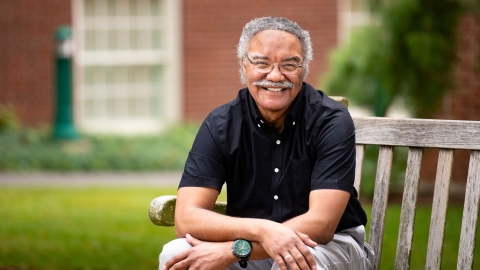
Joel Wade, Psychology
July 18, 2023
I often find that I'm setting aside an article or something I’ve read in a book for use in class and because it would be interesting for future study. So for me it all fits together.
Most people have experienced jealousy at one time or another, especially in the context of romantic relationships. Bucknell University Professor T. Joel Wade, psychology, has found that emotional cheating is the most effective way to induce jealousy, but physical cheating is more upsetting for people.
Wade began his career by focusing on how relationships and attraction functioned, but he always found himself asking, "Why is attractiveness so important?" The common answer in the literature was culture, but he looked deeper. He began reading more about evolutionary theory, an approach to psychology that looks at adaptation as a way to explain behavior and traits. "It was one of the few areas that really said something important about attraction, beauty, relationships — rather than looking at them as shallow topics that you can be interested in, but you don't really tell people about," he says.
Wade's past research on jealousy sparked his current interest. "What I've been working on recently is looking at relationship termination and mate expulsion — basically breaking up. From an evolutionary theory perspective, what accounts for breaking up? What factors would lead to a breakup? I've also started research looking at how people go about avoiding a breakup," he says. Wade typically finds sex differences regarding sexual and emotional accessibility. A lack of sexual access is more likely to lead to a breakup for men, while lack of emotional access is more likely to lead to a breakup for women.
His research on breakups led him to begin to think about what's sometimes the next step after a breakup or a lover's spat: reconciliation. "Not everyone breaks up or decides to leave each other permanently," he says. "What would people do to try to preserve their relationships?" He realized that although there is some research on reconciliation in clinical psychology, the subject hasn't really been addressed in evolutionary social psychology. What he's finding so far is that there seems to be an emotional versus sexual dichotomy.
"Men report being more likely to try to do things that indicate to their female partner that one, they're sorry, but two, that they are emotionally committed — that they want to be exclusive," he says. "Women report more actions associated with sex and sexual behavior as reconciliation behaviors than men."
Wade is able to link his teaching and research at Bucknell in his Social Psychology and Psychology of Beauty & Attraction courses. He enjoys the process of teaching undergraduates to learn how to approach and conduct research and watching them go from trepidation to confidence. And he appreciates the support Bucknell provides for undergraduate research as well as the student investment.
"I like the faculty-student interaction," he says. "The teaching facilitates the research, but the research also facilitates the teaching. In order to teach classes well and to present new and exciting information to the students, I'm keeping up with theoretical developments in my area. I often find that I'm setting aside an article or something I've read in a book for use in class and because it would be interesting for future study. It all fits together."

